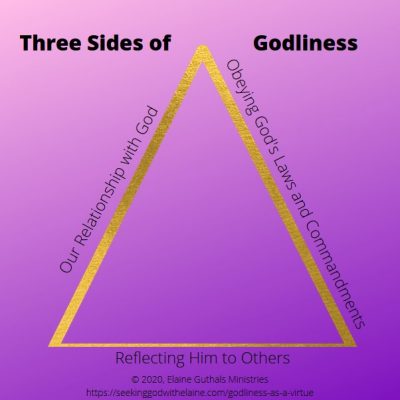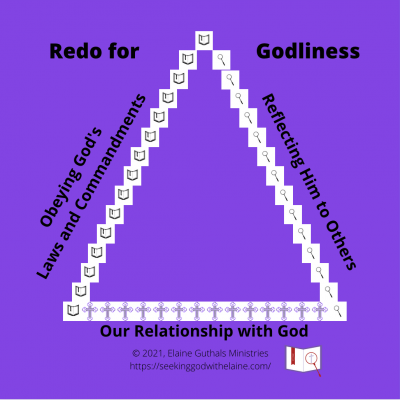When we sin, we need a redo to get back to godliness. Luckily, God allows that. This daily devotional looks at the fear of the Lord as the foundation of godliness and how we will be looking at that throughout the year.
Nuggets
- After we start getting better at disciplining ourselves, we need to put godliness into practice.
- God makes us new creatures so we can have a redo.
- We shouldn’t focus on the sin; instead, our focus needs to be on our Redeemer and His call for us.
- Fear of the Lord, the Old Testament term is the same concept called godliness in the New Testament.
• We begin to put the fear of the Lord into correct perspective when we realize what God has done for us.
Devotions in the Review 101: Godliness series

A couple of months ago, we looked at how we are to be children of God. That can be a difficult concept — ask Nicodemus.
Glossary
We said that Paul really didn’t explain it much better to some peoples’ estimation. “Therefore, if anyone is in Christ, he is a new creation. The old has passed away; behold, the new has come” (II Cor. 5: 17 ESV).
I found a really great quote by Vaughan helped me understand. He wrote, “This image does not convey the idea of a perfectly new being, but of an old being begun again, that it may do better.”
Resource
God makes us new creatures, so we get to have a redo.
Most of us are probably jumping up and down with joy because we didn’t get it right the first time. Well, we begin a new year today. This is our opportunity for a redo.
I told you last year when we were looking at self-discipline, I thought God would be saying, “You need to work on this sin, that sin, and the other sin.”
God didn’t. He told me I needed to mature my faith. I feel like I did mature last year. I hope you did, too.
So, new year — new word.
When we did Godliness as a Virtue, I did (what I thought was) a really neat graphic on the three sides of godliness.
- Our Relationship with God
- Obeying God’s Laws and Commandments
- Reflecting Him to Others
To read a related devotion, click the button below.

What better place to go next?! After we start getting better at disciplining ourselves, we need to put that into practice.
The thing is, I still don’t see God as saying, “So now we are going to get around to work on this sin, that sin, and the other sin.” Oh, yes. That is going to be the how.
The what, though, is how do I become more like Him? That is the focus.
Our goal is to have God’s character — to be godly.
We talked in How Are God’s Messengers Supposed to Respond, that a lot of times, we focus solely on our relationship and what we have to do to get back into obedience. I want to reshare this nugget.
To read a related devotion, click the button below.
Robinson wrote, “It never helps anyone to begin desperately to study his wickednesses with a view to outroot them. It is better for him to keep looking at God. The objective study of Christ, His life, character, etc., is far safer and more profitable for growth in grace than any painful act of self-examination.”
Resource
We shouldn’t focus on the sin. Our focus needs to be on our Redeemer and His call for us.
This has been rummaging around in my mind since August, so I have a little better head start this year for where I think God is leading me — and you since you have chosen to come along for the ride.
In all honesty, I can’t say I am any better organized. I have a lot of things in the drafts folder, but there is no real schedule — yet.
Let’s start out with what we know about godliness. Our discussions started out calling it fear of the Lord, the Old Testament term. The same concept is called godliness in the New Testament.
Let's Put It into Context
Godliness, equated with the Old Testament term fear of the Lord, is an attitude of reverence that is promoted by walking in His Spirit. The fear of the Lord means awe, reverence and love, not terror.
The glossary page is a little lacking.
- The fear of the Lord means reverence and love, not terror (What Does Fear of the Lord Mean?).
• Our following God’s laws and commandments shows that we fear God (Finding Favor by Acknowledging God).
• When we fear God and give honor to Him, we want to serve Him (What Constitutes an Obedient Disciple?).
• Walking in the Spirit should promote the fear of the Lord (What Does It Mean to Walk in the Spirit?).
• The New Testament term godliness is equated with the Old Testament term fear of the Lord (Godliness as a Virtue).
• God’s intent is us loving Him, and we show that love by obeying Him. Obedience means we not only hear God’s Word but also follow His instructions (Can We Change the Scriptures?).
To read a related devotion, click the appropriate button below.
We have a whole year to rectify that. So, let’s start by working on the foundation.
Fear of the Lord: The Foundation of Godliness
“Fear of the Lord is the foundation of true wisdom. All who obey his commandments will grow in wisdom” (Ps. 111: 10 NLT)
Let’s start with fear of the Lord. That is the Old Testament term, which is the foundation for the New Testament. So, let’s build the foundation.
Maccolloch expanded our definition. He wrote fear of the Lord denotes “… affection of reverence, which arises in the mind by means of the contemplation of the grandeur and dominion, the power and righteousness, with the other Divine excellences of Jehovah. It adores His greatness; it venerates His purity; it respects His omniscience; it does homage to His goodness; it stands in awe of His power; it honours His justice, and is solicitous to avoid His displeasure.”
Resource
Hmmm. I don’t know if I would have used the word affection to describe it. A fondness seems shallower than what I would associate with reverence.
The grandeur, dominion, power, and righteousness fit with God.
- “Splendor and majesty are before him; strength and joy are in his place” (I Chron. 16: 27 CSB).
- “Now we have this treasure in clay jars, so that this extraordinary power may be from God and not from us” (II Cor. 4: 7 CSB).
- “Now he is far above any ruler or authority or power or leader or anything else—not only in this world but also in the world to come” (Eph. 1: 21 NLT).
- “And be found in him, not having a righteousness of my own that comes from the law, but that which comes through faith in Christ, the righteousness from God that depends on faith” (Phil. 3: 9 ESV).
It also speaks of some other words about which we’ve talked: purity, omniscience, goodness, justice.
- “Create in me a clean heart, O God, and renew a right spirit within me” (Ps. 51: 10 ESV).
- “For whenever our heart condemns us, God is greater than our heart, and he knows everything” (I Jn. 3: 20 ESV)
- “The LORD passed before him and proclaimed, “The LORD, the LORD, a God merciful and gracious, slow to anger, and abounding in steadfast love and faithfulness” (Ex. 34: 6 ESV).
- “Therefore the Lord waits to be gracious to you, and therefore he exalts himself to show mercy to you. For the Lord is a God of justice; blessed are all those who wait for him” (Isa. 30: 18 ESV).
That means the fear of the Lord is an awe and reverence to which God is due. We should want to always possess this toward Him.
So, what does that mean for us? “What then shall we say to these things? If God is for us, who can be against us?” (Rom. 8: 31 ESV).
Spurgeon said that this fear “… dwells with it [love] in harmony.” He doesn’t want us to keep our distance. He wants communion.
Resource
We begin to put the fear of the Lord into correct perspective when we realize what God has done for us. “For God so loved the world that he gave his one and only Son, that whoever believes in him shall not perish but have eternal life” (Jn. 3: 16 NIV).
God actually had His Son be born as a human being so that He would be the Sacrifice to pay the penalty for our sins. Sins are actions by humans that disobey God and break one of His reasonable, holy, and righteous laws and commandments, goes against a purpose He has for us, or follows Satan’s promptings.
Wow.

So, Where Is Our Road Taking Us This Year?
- I think I am going to start out looking at all the verses that talk about godliness.
- Then we will talk about ungodliness. I want to look at the term days of Noah as it applies to the end days. This would fall under Obeying God’s Laws and Commandments.
- We also need to look again/further into Who God and Jesus are. How can we imitate them if we don’t really know Who They are? This addresses Our Relationship with God.
- Transitioning from being ungodly to being godly could straddle Obeying God’s Laws and Commandments and Our Relationship with God.
- Working on being godly could straddles all three categories.
As usual, things may change as I dig into the topics. We’ll just have to see where this takes us.
Father God. It is our prayer and desire to become more like You. That is Your Will for us, and You have made us so that we can grow. Help us this year as we do a redo. Grow us in the areas You know we need. Amen.

What do you think?
Leave me a comment below (about this or anything else) or head over to my Facebook group for some interactive discussion.
If you don’t understand something and would like further clarification, please contact me.
If you have not signed up for the email daily or weekly providing the link to the devotions and the newsletter, do so below.
If God has used this devotion to speak with you, consider sharing it on social media.
Pingback: Godliness: The Parent of Contentment – Seeking God with Elaine
Pingback: Growing in Godliness – Seeking God with Elaine
Pingback: The Form of Godliness – Seeking God with Elaine
Pingback: Why and How Are We to Live Godly Lives? – Seeking God with Elaine
Pingback: How Does God’s Expectations for Us Lead to Godliness? – Seeking God with Elaine